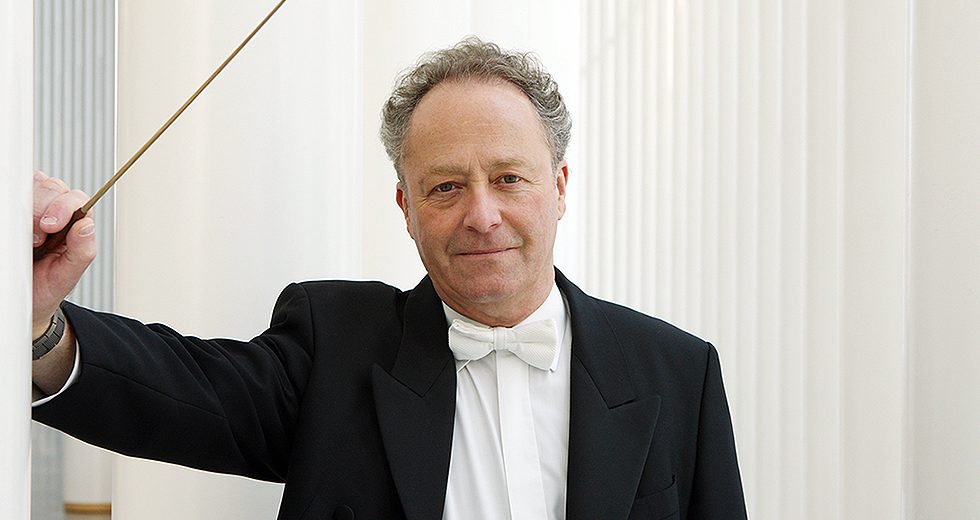
In just two years, Emmanuel Krivine has changed his Chicago status from newcomer to regular. The veteran French conductor made his debut with the Chicago Symphony Orchestra in 2016, and he will appear with the CSO for two sets of concerts by the end of this season. He was back in March as a substitute and returns for long-scheduled performances May 11-12 and 15.
Krivine’s May program will feature Brahms’ Tragic Overture, Op. 81, and Saint-Saëns’ Symphony No. 3 in C Minor, Op. 78 (Organ), with Grammy Award-winning organist Paul Jacobs in the featured part. Rounding out the lineup will be the first performances on the CSO’s subscription series of Schumann’s Violin Concerto in D Minor. German violinist Isabelle Faust will make her CSO debut as the soloist in this oddly under-recognized work, which she has recorded and championed.
In advance of these concerts, Krivine reflected on his first season as music director of the Orchestre National de France and his blooming relationship with the CSO. His responses in French have been translated and edited:
A year into your tenure, what’s your assessment of the Orchestre National de France?
It is a very involved orchestra that loves music. They have a very long tradition and have collaborated with very good conductors. I am honored to follow some excellent music directors. In addition, there has not been a Frenchman as music director of this orchestra since the departure of Jean Martinon [music director of the Chicago Symphony from 1963 to 1968] in 1973; I am delighted to be associated with him.
Because of your responsibilities there, are you taking on fewer guest conducting assignments?
Indeed, that does take much time, but I am continuing, however, to visit certain orchestras. I am also principal guest conductor of the Scottish Chamber Orchestra.
How do you select your guest conducting engagements? Would you like to work more elsewhere?
I have slowed down lately because I like to spend more time with each program, and I must say that life in hotels is tedious, except when it comes to passionate orchestras. I’ve always said that America is the paradise of orchestras. I advise young conductors or students to go as early as possible [to the United States], because American orchestras have certain common qualities: an open spirit, a strong sense of responsibility when it comes to the “collective personality,” a level of preparation at the first rehearsals, the involvement and focus of the musicians and the pride of playing together as a group. The role of the maestro is more functional than monarchical, which allows a conductor to be a “musician with empty hands playing a sonata with an orchestra.”
Were you happy with your CSO debut in 2016?
Very happy. It was a marvelous meeting. I knew the orchestra from afar for a long time with [Fritz] Reiner and [Georg] Solti, whose farewell [in 1991] I attended with my wife. We didn’t have enough handkerchiefs in our pockets, we were so emotional. This orchestra has a very strong personality but is however very receptive and well-mannered. It is moving to feel in the orchestra’s temperament and playing the ethic of Maestro Muti at the same time as his insistence on transversal listening, which matches the CSO so well.
This season, you have two programs with the CSO. What do you think of this opportunity to spend not one but two weeks with this orchestra?
I feel very fortunate to move from the status of “visitor” to one of “friend of the family.” In addition, I was delighted to reconnect [in March] with [violinist] Leonidas Kavakos, with whom I have often performed before. The First Concerto of Shostakovich suits him so well! From the first, I felt how much the CSO identifies with this work. We were all immersed in this inspired and tragic music.
Is it easier to conduct an orchestra once you know it a little better?
Not easier but different. It’s like a meeting between two people: it’s a question of becoming familiar with each other. At the beginning of a relationship, one knows the other only superficially. It’s when one discovers the different facets of the other that one begins to understand. With an orchestra, the relationship is transcended by the music. With humans, we don’t always have this good fortune.
Your May program includes a major French work: Saint-Saëns’ Organ Symphony.
The Tragic Overture pairs well with the Schumann Concerto. I have frequently led these two works and have even recorded the concerto a long time ago with [Jean-Jacques] Kantorow, who was the teacher of Kavakos. It is a pure masterpiece in which we recognize, like the Fantasie for piano, the unfathomable sensibility of Schumann. It is a total contrast with the Saint-Saëns, an essential work in which I can’t wait to hear the CSO and [soloist] Paul Jacobs. Just think that this symphony was written 10 years before Strauss’ [Also sprach] Zarathustra. He [Strauss] had to know the finale.”
Have you worked before with Isabelle Faust?
Yes, often. The last time consisted of Beethoven played on period instruments. She is a very refined and fastidious musician.
Is there anything else you’d like to add?
I’m delighted to be once again in Chicago.
TOP: Emmanuel Krivine | Photo: Christian Aschman